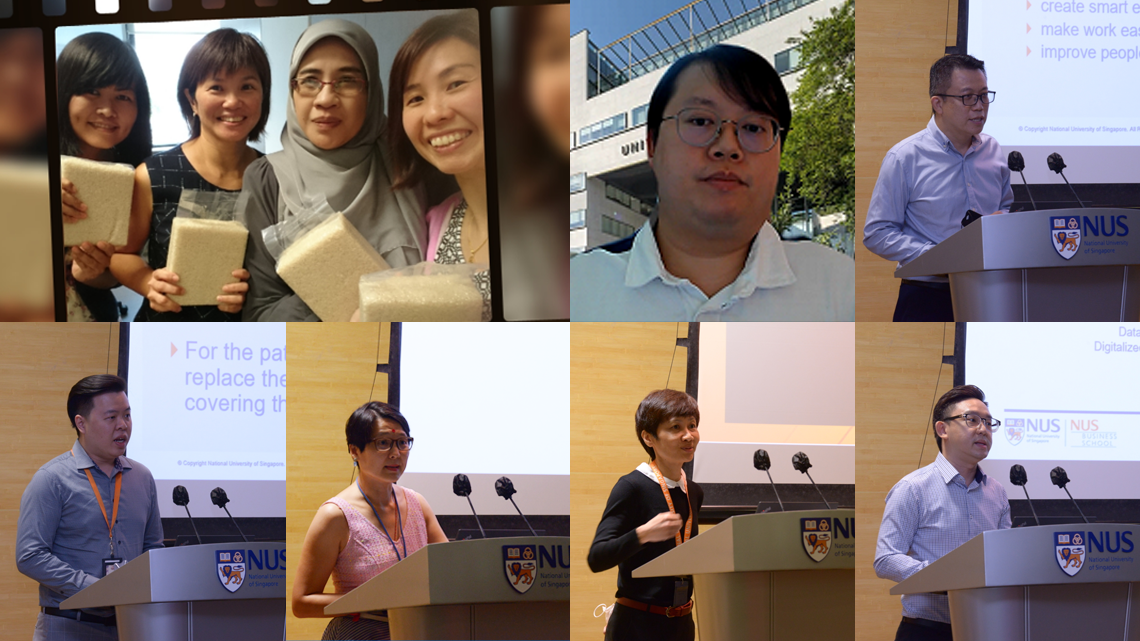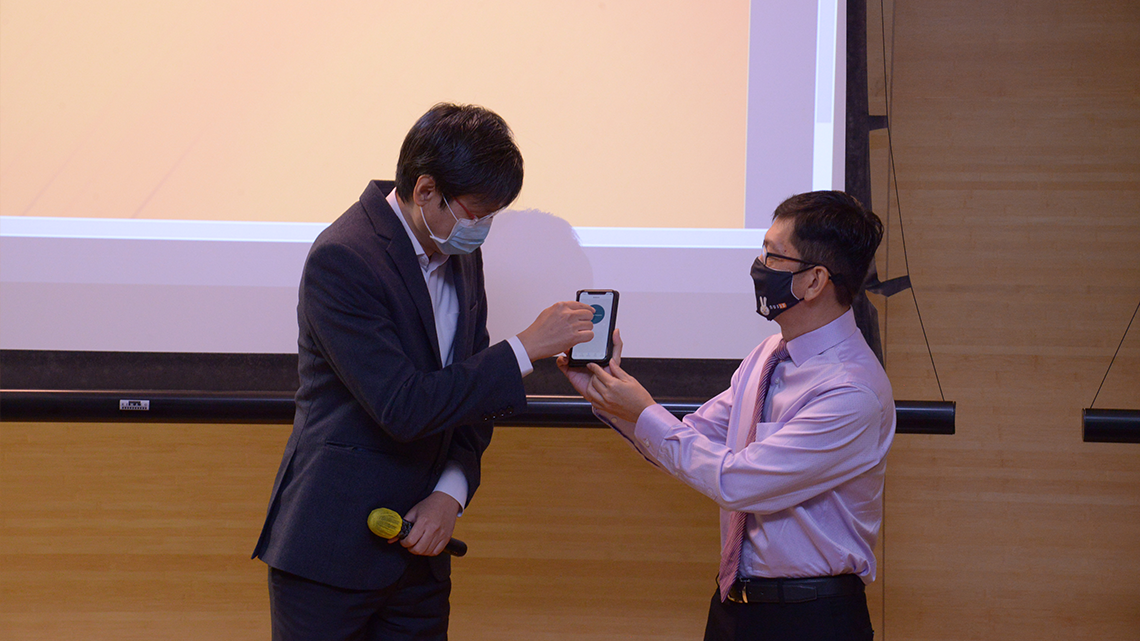Technology is rapidly evolving to generate new ways of working, facilitating the digitalisation of processes for smoother and more efficient work. As such, there is immense potential in raising the digital dexterity of the NUS community. In late 2019, the Digital Enablement Programme was launched as part of the University’s promotion of Lifelong Learning.
The Community of Practice was inaugurated in 2020, celebrating the successful adoption of Robotic Process Automation (RPA). Since then, there has been a remarkable adoption of digital enablement tools through the programme. These tools are used for RPA, data visualisations, electronic signatures, forms, workflows, surveys, web publishing and whiteboard collaborations.
Two years later, on 11 Jan, NUS IT celebrated the continuous and dedicated efforts of staff with an inspiring showcase at the Digital Enablement Community of Practice event.
“The enthusiasm and ingenuity of our fellow colleagues across NUS in learning digital tools and applying their newly acquired skillset effectively to their work has been a tremendous encouragement to all of us in NUS IT,” said Ms Tan Shui-Min, Chief IT Officer, in her welcome speech.
In his opening address, Mr Clarence Ti, Deputy President (Administration), emphasised how digitalisation gave the University a collective view for comprehensive analysis to guide decision-making.
“In this day and age, moving to a digital form... makes so much more sense and it will allow us to use less paper. Beyond just forms, when we examined existing processes at work and saw how manual and repetitive many were, we knew there were many opportunities for other forms of automation and potential for continuous improvement with the digitalisation of our processes,” he said.
NUS IT’s Digital Enablement team, led by Mr Tan Keok Tay, Associate Director, supports the many innovative projects across NUS and spearheads training through the Digital Enablement Programme for the University’s growing collection of Digital Enablement Tools, including Microsoft Teams, Forms, Power Automate and Qualtrics.
Besides dramatically increasing personal and team productivity, these projects drew appreciation for their fellow colleagues’ deep understanding of the processes involved, their flexible mindset and resourcefulness -- all necessary ingredients for successful digitalisation.
Case studies shared
Various units and departments also shared their journeys towards digital enablement. The Faculty of Science highlighted how they used Power Automate to decrease the time taken to generate and issue individualised Masters Programme offer letters, cutting down processing time for each letter from 30 minutes to 5 minutes. Human errors were also minimised. The faculty voiced their recommendation for other departments to adopt the same methodology for email distribution tasks.
The Registrar’s Office used Microsoft Forms and Flow to automate the extension and reapplication of student passes. This has transformed a highly manual and laborious process into one that is streamlined and with lesser human intervention, reducing processing time by 20 per cent.
 Speakers from various departments shared their journeys towards digital enablement. Top row from left, Ms Au Kasie, Ms Teo Chwee Hoon, Ms Roslindah Binte Kamarulbahrin, Ms Chng Bee Choo, Mr Joshua Tan, Mr Junius Soh. Bottom row from left, Mr Kenny Siow, Ms Koh Wei Kee, Ms Lee Mei Kay, Mr Danny Ling.
Speakers from various departments shared their journeys towards digital enablement. Top row from left, Ms Au Kasie, Ms Teo Chwee Hoon, Ms Roslindah Binte Kamarulbahrin, Ms Chng Bee Choo, Mr Joshua Tan, Mr Junius Soh. Bottom row from left, Mr Kenny Siow, Ms Koh Wei Kee, Ms Lee Mei Kay, Mr Danny Ling.
University Campus Infrastructure, represented by Mr Junius Soh, Senior Associate Director, and Mr Kenny Siow, Specialist Associate, shared how they leveraged Microsoft Forms to manage approvals on variation works as well as enabling the management of Vehicle Inspection Checklist data across various platforms, including the smartphones of the Campus Emergency Security patrol vehicle drivers.
The College of Design and Engineering also used Microsoft Forms alongside Flow to automate programme survey administration and provide oversight for the efficient tracking of responses from programme participants on the effectiveness of their course. Ms Koh Wei Kee, Director, and Dr Lee Mei Kay, Associate Director, shared how these digital tools allowed the then School of Design and Environment to reduce manual work by 90 per cent and improve their response rate from 45 per cent in 2020 to 100 per cent in 2021.
Going beyond the suite of Digital Enablement Tools, NUS Business School’s MBA Programmes Office, represented by Mr Danny Ling, Admissions and Marketing Team, added Python on top of Microsoft Forms, Power Automate and Power BI as they addressed challenges in having MBA admissions data spread across multiple sources leaving them vulnerable to repetitive manual processes and susceptible to errors. Overall, they automated a total of 28 processes, saving an estimated 1,200 hours annually.
 Mr Clarence Ti, Deputy President (Administration), unveils the recipients of digital badges on screen with the tap of a smartphone.
Mr Clarence Ti, Deputy President (Administration), unveils the recipients of digital badges on screen with the tap of a smartphone.
Honour roll
Finally, with the tap of a smartphone screen by Mr Clarence Ti, the event concluded with an awards ceremony starting with the unveiling of digital badges for staff who completed RPA, Data Visualisation and Forms & Flow courses. This was followed by awards for MODEL (MOst Digitally-EnabLed) departments presented to Duke-NUS, School of Medicine and Office of Human Resources for having the greatest number of staff possessing awareness and knowledge of the various digital enablement tools.
In addition, awards for FRIENDS (ForwaRd In Excellence aNd Digitally Savvy) were presented to Mr Ng Hoong Chang, Registrar’s Office, Mrs Norwedad Binte Sunny, NUS Business School, and Mr Junius Soh, University Campus Infrastructure. This award recognised the completion of the required training and the awardees’ work to promote digital practices, which play a substantial role in the development and delivery of new digital initiatives in their respective departments.
It is hoped that these case studies serve to inspire the rest of the NUS community to pick up new skills and knowledge of Digital Enablement tools to make their own workflows more efficient, and further the development of the University's digital agility. To begin your own Digital Enablement journey, find out more here.
Watch the Digital Enablement Community of Practice event here.
Do you have your own OE Story to tell? We are inviting submissions of OE efforts across NUS! Please click on this link to find out more about the contribution guidelines and to submit your story.